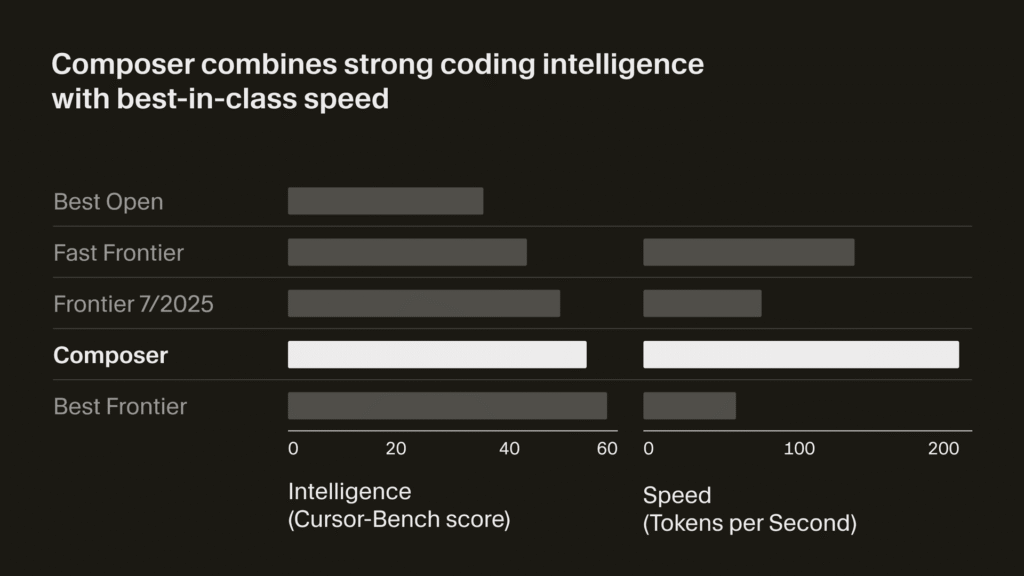Vibe coding
The vibe-coding IDE put an emphasis on speed with Composer.
Cursor 2.0’s flagship features are a new coding model and a multi-agent interface. Credit: Cursor
Cursor has for the first time introduced what it claims is a competitive coding model, alongside the 2.0 version of its integrated development environment (IDE) with a new feature that allows running tasks with multiple agents in parallel.
The company’s flagship product is an IDE modeled after Visual Studio Code in many respects, but with a strong emphasis on vibe coding and heavier direct integration of large language model-based tools in the interface and workflow. Since its introduction, Cursor has supported models developed by other companies su…
Vibe coding
The vibe-coding IDE put an emphasis on speed with Composer.
Cursor 2.0’s flagship features are a new coding model and a multi-agent interface. Credit: Cursor
Cursor has for the first time introduced what it claims is a competitive coding model, alongside the 2.0 version of its integrated development environment (IDE) with a new feature that allows running tasks with multiple agents in parallel.
The company’s flagship product is an IDE modeled after Visual Studio Code in many respects, but with a strong emphasis on vibe coding and heavier direct integration of large language model-based tools in the interface and workflow. Since its introduction, Cursor has supported models developed by other companies such as OpenAI, Google, and Anthropic. However, while it has trialed its own built-in models, they weren’t competitive with the big frontier models.
It’s a different story now, according to the company’s claims about Composer. Built with reinforcement learning and a mixture-of-experts architecture, Composer is dubbed by Cursor “a frontier model that is 4x faster than similarly intelligent models”—a significant claim when you consider what it’s competing with.
The emphasis seems to be on speed. In a benchmark chart displaying Cursor’s internal Cursor-Bench for intelligence and tokens per second for speed, Composer underperforms compared to the “best frontier” and outperforms top-tier open models and speed-oriented frontier models in intelligence. However, it vastly outpaces its competitors in speed.

Keep in mind: This is based on an internal benchmark at Cursor. Credit: Cursor
Cursor is hoping Composer will perform in terms of accuracy and best practices as well. It wasn’t trained on static datasets but rather interactive development challenges involving a range of agentic tasks.
Intriguing claims and strong training methodology aside, it remains to be seen whether Composer will be able to compete with the best frontier models from the big players.
Even developers who might be natural users of Cursor would not want to waste much time on an unproven new model when something like Anthropic’s Claude is working just fine.
To address that, Cursor introduced Composer alongside its new multi-agent interface, which allows you to “run many agents in parallel without them interfering with one another, powered by git worktrees or remote machines”—that means using multiple models at once for the same task and comparing their results, then picking the best one.
The interface is an invitation to try Composer and let the work speak for itself. We’ll see how devs feel about it in the coming weeks. So far, a non-representative sample of developers I’ve spoken with has told me they feel that Composer is not ineffective, but rather too expensive, given a perceived capability gap with the big models.
You can see the other new features and fixes for Cursor 2.0 in the changelog.
Samuel Axon is the editorial lead for tech and gaming coverage at Ars Technica. He covers AI, software development, gaming, entertainment, and mixed reality. He has been writing about gaming and technology for nearly two decades at Engadget, PC World, Mashable, Vice, Polygon, Wired, and others. He previously ran a marketing and PR agency in the gaming industry, led editorial for the TV network CBS, and worked on social media marketing strategy for Samsung Mobile at the creative agency SPCSHP. He also is an independent software and game developer for iOS, Windows, and other platforms, and he is a graduate of DePaul University, where he studied interactive media and software development.